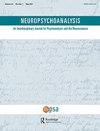对Otto Kernberg《神经生物学新发展对精神分析客体关系理论的影响》的评论
Q3 Psychology
引用次数: 1
摘要
许多精神分析学家认为,神经科学本质上可以而且应该影响精神分析,检查和整合相关信息至关重要(Busch, 2019b),而其他人则认为,将这些发现应用于精神分析是不相关的,甚至是有害的(Blass & Carmeli, 2007)。因此,对于在这一领域写作的精神分析学家来说,重要的是要具体说明神经科学如何影响他们的理论和临床观点。精神分析学家还需要警惕确认偏差,将神经科学的发现倾斜,以适应他们先前存在的概念和方法。克恩伯格博士有力地证明了神经科学与精神分析学的驱力和动态无意识概念之间的关联,但他不太清楚神经科学对技术的影响。他的结论提出了关于精神分析理论和治疗的重要问题和可能的重新表述,这些问题涉及情感和驱动力的本质,自我和其他表征,无意识的结构,未表述的经验,创伤的影响,以及身体的角色。本文章由计算机程序翻译,如有差异,请以英文原文为准。
Commentary on “Some Implications of New Developments in Neurobiology for Psychoanalytic Object Relations Theory” by Otto Kernberg
Many psychoanalysts believe that neuroscience inherently can and should influence psychoanalysis, and it is crucial to examine and incorporate relevant information (Busch, 2019b), whereas others speak, sometimes vehemently, of the irrelevance and even damage of applying these findings to psychoanalysis (Blass & Carmeli, 2007). Therefore, for psychoanalysts writing in this area, it is important to be specific about how neuroscience affects their theoretical and clinical perspectives. Psychoanalysts also need to be alert for confirmation bias, slanting neuroscientific findings to fit their preexisting conceptions and approaches. Dr. Kernberg makes a strong case for the relevance of neuroscience to psychoanalytic concepts of drive and the dynamic unconscious but is less clear about its impact on technique. His conclusions raise important questions about and possible reformulations of psychoanalytic theory and treatment regarding the nature of affect and drive, self and other representations, the structure of the unconscious, unformulated experience, the impact of trauma, and the role of the body.
求助全文
通过发布文献求助,成功后即可免费获取论文全文。
去求助
来源期刊

Neuropsychoanalysis
Psychology-Neuropsychology and Physiological Psychology
CiteScore
2.50
自引率
0.00%
发文量
24
 求助内容:
求助内容: 应助结果提醒方式:
应助结果提醒方式:


